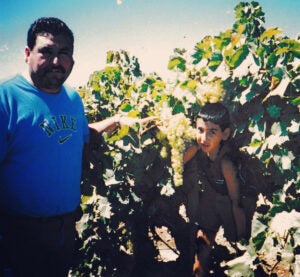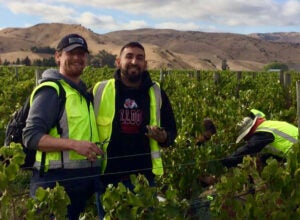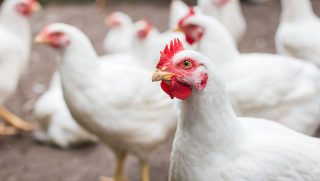Growing up, my life was always surrounded by agriculture. I was raised in a small town in South Monterey County, California, named San Lucas. The phrase, “blink and you might miss it” has never rung truer than when speaking about San Lucas.
Here, the number of vines on my family’s 3,000-acre vineyard far outnumbered the human population of 250. My dad was the vineyard manager and subsequently the viticulturist of the property we were lucky enough to live on.
This is where my obsession with the vineyard and agriculture began I remember sitting in my father’s truck while we went from block to block to switch irrigation sets. I knew then that I wanted to follow in his footsteps.

In high school I took a big interest in FFA thanks to my uncle, who had been a star FFA student at his high school. He was another person who inspired me to get involved with ag. I showed livestock all four years of high school and, despite my detest for the theatrics and recitals, I served as a treasurer officer in my local chapter as well.
After high school, I attended California State University, Fresno. It was a dream come true to attend Fresno State for one significant reason: their viticulture and enology program. By my account, the best in the state, no matter what UC Davis says. I earned my degree in 2019.
Afterward, I worked all over California — from Napa to Paso Robles. I also spent a six-month stint in New Zealand as a seasonal winemaker, which allowed me to experience how wine was being produced outside of my beloved California.
Growing up in a Hispanic household, I was always taught to work hard give my best effort. These are values instilled in many of us who have immigrant parents who work hard to provide for their families. Its something I’ve always been very proud of. These are the set of values that allowed me to be successful while working on the other side of the globe.
Having spent my entire life in the ag industry, the notion that agriculture lacks diversity initially seemed true, but not in the way one might expect. Growing up, my interactions at the vineyard were primarily with Hispanic individuals, who comprise a majority of the labor force responsible for the demanding manual work essential for farming most of our crops.
However, as I matured, I realized that the perceived lack of diversity was more linked to positions of leadership than the labor force itself. Throughout my career, I discovered that diversity thrived in vineyards and other agricultural sectors, yet it became evident that representation was lacking in leadership roles. Working closely with individuals in the vineyard and cellar, I found many who spoke Spanish, some conversing in dialects native to Southern areas of Mexico. Despite their pivotal roles in farming grapes and harvesting crops, these individuals were seldom showcased, denying the public the chance to appreciate their significant contributions to the industry.
In examining the industry’s demographics, online job site Zippia reveals that 68.8 percent of winemakers are White males, with only 15.7 percent being Hispanic, despite our substantial presence and influence. The percentage is even smaller for Black winemakers at 4.9 percent.
My experiences at some of Napa’s premier wineries challenged the notion that diversity is lacking in the industry. While prestigious roles like winemaking may exhibit a lack of diversity, my time in the cellar exposed me to a vibrant and varied group of coworkers — Hispanic, African American, Filipino, and White — all united by a common goal: crafting exceptional wine. This realization underscores the need for increased visibility and recognition of diverse talent in the agricultural industry.

Agriculture is the backbone of our society, providing sustenance worldwide. In my internship, I aim to spotlight the often-overlooked voices in the industry, not only those physically harvesting fruits and vegetables but also the underrepresented individuals making significant contributions.
It’s time to give due recognition to those who work diligently, often by hand, ensuring fresh produce and other products reach our tables. The agricultural sector has faced challenges with marginalized communities, and my goal is to bridge this gap, emphasizing the importance of every individual in our industry and shedding light on their vital role in bringing the harvest from the field to our plates.
David Salazar serves as the 2024 American Farmland Trust Agriculture Communications Intern at AGDAILY, with a focus on helping to amplify diversity and minority voices in agriculture. David is originally from King City, California, and attended the University of California, Fresno, as a first-generation college student. He received a bachelor’s degree in viticulture and enology and has worked in California’s premier wine producing regions.





